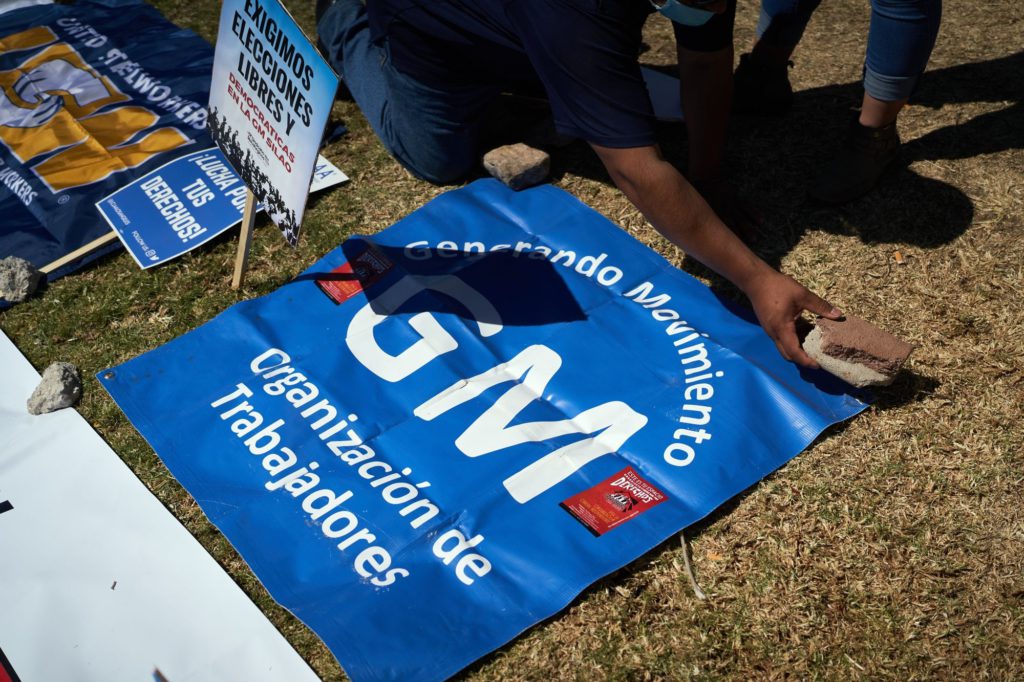(Bloomberg) — The U.S. is investigating labor-rights violations in Mexico and expects to bring more complaints after cases at two automotive plants led to workers voting to recognize independent unions.
The votes on Monday at parts maker Tridonex and last month at a General Motors Co. truck plant show that the rapid-response mechanism of the U.S.-Mexico-Canada Agreement is working, Deputy U.S. Trade Representative Jayme White said in an interview on Thursday.
Both cases saw workers oust CTM, Mexico’s old-guard labor organization, which activists have long criticized for negotiating deals to suppress pay for workers making a fraction of their U.S. peers. Low labor costs led manufacturers to move jobs south of the border, a key complaint for President Donald Trump when he demanded to renegotiate the North American Free Trade Agreement.
The votes, following complaints last year by the USTR and the AFL-CIO labor federation, send a “strong market signal” to employers that the U.S. and Mexico won’t tolerate worker abuse, said White, who helped craft the labor rules as a staff member in the U.S. Senate.
More Probes
The U.S. is receiving tips from workers and labor unions and is cooperating closely with the Mexican government, White said.
President Andres Manuel Lopez Obrador’s administration pushed through a law in 2019 that expands workers’ rights, partly in hopes that it will eventually lead to higher wages. American labor groups want to see wages in Mexico increase to reduce the incentive for companies to shut factories in the U.S. and move jobs abroad.
“There are some folks that we’re eyeing and investigating,” White said, while declining to identify them. “As part of the USMCA, we have more resources for labor in general, for rapid response. This is very much a priority for this administration.”
The Biden administration’s trade agenda has focused on workers and enforcement of existing deals rather than continuing talks begun under Trump for new agreements with the U.K. and Kenya. The Tridonex and GM cases were the first two tests of the rapid-response labor dispute-settlement mechanism from the USMCA deal that took effect in July 2020.
The U.S. is also looking “very closely” at concerns regarding Mexico’s proposed electricity overhaul, White said. He added that he’s raised the issue several times with his Mexican counterpart, undersecretary of economy for trade Luz Maria de la Mora.
U.S. Trade Representative Katherine Tai has discussed it with Mexican Economy Minister Tatiana Clouthier and the U.S. is trying to resolve the issue diplomatically, according to White.
“It is very much on our radar,” he said.
Energy Reforms
Mexico’s president is proposing to change the constitution, currently being debated to give state utility CFE a bigger share of the power market. But Mexico’s carbon-emissions risk and electricity costs could jump if the country passes the reforms, according to a report by the U.S. Energy Department’s National Renewable Energy Laboratory.
Lopez Obrador is a long-time critic of energy reforms enacted in 2013-14 that ended almost eight decades of energy nationalization, saying that they betrayed the nation’s citizens by handing natural resources to private companies. Since taking office in 2018, he’s vowed to return the state-owned oil company Petroleos Mexicanos, known as Pemex, and CFE to their former glory by scaling back private-sector participation in the industry.
White, who keeps a chess board on the conference room table in his office at USTR headquarters in Washington, said that part of the calculus in deciding whether to lodge a formal complaint includes anticipating how Lopez Obrador’s administration would react.
“You have to be thinking a few moves down,” he said.
The U.S., Mexico and Canada are in the process of forming a dispute resolution panel for a disagreement on regional content for cars. White disagreed with Mexican Economy Minister Tatiana Clouthier’s criticism that the U.S. is disputing the Mexican and Canadian view of the rules for political rather than legal reasons. The United Auto Workers, the industry’s largest U.S. union, supports the Biden administration’s stricter interpretation of the USMCA.
USTR lawyers have “expressed a lot of confidence in our position,” White said. “I don’t think that we’re motivated by politics. We’re motivated by the text and spirit of the USMCA.”
More stories like this are available on bloomberg.com
©2022 Bloomberg L.P.











